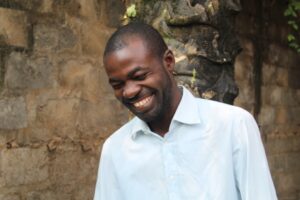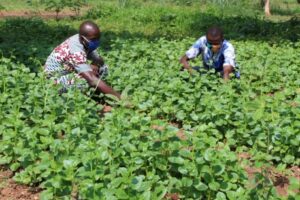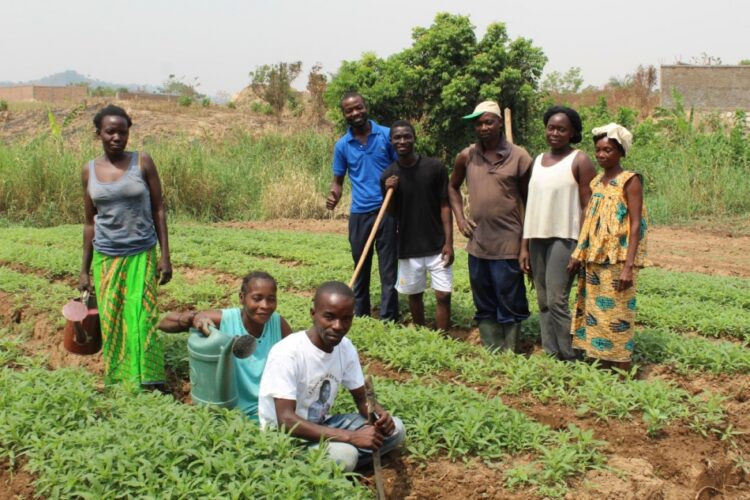Young people in Bangui turn their training into skills to share with their entire community.
Whilst studying for his business degree, Emmanuel had dreams of being an entrepreneur and earning good money. But after he graduated, the 29-year-old struggled to find opportunities in his home city of Bangui, the capital of the Central African Republic (CAR). Youth make up 70 percent of the population of CAR, a country which has been afflicted by years of crises and conflict.
Many young people find themselves in a similar situation to Emmanuel, with plenty of hopes and dreams but few opportunities to carry them out. Emmanuel, however, thought that there was one sure-fire way to make money and support himself: agriculture. There would always be money in food production because, after all, he reasoned, everyone has to eat!
He began by doing some small-scale farming, hoping to use his business skills, reinvest his profit and grow his small business. But with minimal training and resources, it was initially hard to make ends meet. Emmanuel, however, was then introduced to FAO’s Junior Farmer Field and Life Schools (JFFLS) programme in his area.
Equipping youth with the skills they need
FAO’s JFFLS programmes provide agricultural and entrepreneurial training for young people in rural areas. These JFFLS programmes have been implemented in many countries around the world, focusing on providing vulnerable youth, especially in crisis and post-conflict contexts, with practical and commercial farming skills.
Emmanuel heard about the programme after speaking to an FAO Youth Coordinator, who invited him to take part in the training. He was part of the first group of young people in CAR to go through the training, which took place in Boali, 95 kilometres away from Bangui.
“The training allowed me to sharpen my knowledge of market gardening and animal husbandry,” said Emmanuel. “Now, I not only limit food production losses but also maximise profits.”


The turnaround
Emmanuel farms as part of a group of young agricultural entrepreneurs. They named the group ‘E MAÏ’, meaning ‘Let’s Develop’ in the Sango language, because of their goal to develop themselves and their community through their activities. Before the training, his group did not have the necessary technical know-how or sufficient tools – in fact, they only had about one tool for every three people.
After the training, Emmanuel returned to Bangui and began applying what he learned with the other members of E MAÏ. He put into practise new small livestock and market gardening farming techniques, including correct use of fertilisers, choice of seeds and planting and harvesting schedules. E MAÏ now grows amaranth, cabbage, tomato, spinach and other greens that they are able to sell to the local community. They share the profit and keep a part to reinvest.
“We started with 14 nursery beds of 10 metres each and with the support of FAO, we upgraded to 15, bigger beds. Today we are in the process of transitioning to fifty 20-metre nursery beds because we have acquired more space near our original site,” Emmanuel shares proudly.
Emmanuel was recently elected president by the other group members, and now teaches what he learned to others in the community.
Local farming experts
Emmanuel and the members of E MAÏ are now the go-to people for improved small-scale farming techniques in their community.
“People come to us to ask for advice and guidance, and we provide it to them. It’s our contribution to the community’s progress.” Emmanuel says. “Some young people around our market gardening site have joined the group to learn. We really want to innovate and create more opportunities for young people.”
Today, E MAÏ is flourishing, feeding themselves with what they produce and paying for their needs with the profit generated from sales of their produce. They are now looking into reinvesting the profits and diversifying through canning and other preservation techniques, such as making tomato puree, to reduce post-harvest losses and make a more stable income throughout the year. Thanks to the new skills he learned, Emmanuel has even become a facilitator of the JFFLS approach along with 24 of his peers.
“Honestly, I got into agriculture to tide me over until I could get a job I wanted. After the JFFLS facilitators’ training, I have realised that I can make a living out of this. I love what I do, and I will continue in this line of work to build a future for myself and my family,” Emmanuel says.
Innovative agriculture can offer gainful employment for rural youth, ensure food security for communities and build a hunger-free world.
Learn more
- Main article: FAO Stories
- Website: FAO Country profile: Central African Republic
- Publication: Junior farmer field and life schools in the Central African Republic

